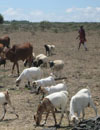LPP in United Nations panel

The League for Pastoral Peoples and Endogenous Livestock Development (LPP) will be a member of a panel discussion on “the crucial role of genetic resources in ensuring food security in a changing climate” at the United Nations in New York on 13 May 2009.
The discussion is hosted by the Nordic Council of Ministers at the UN headquarters as part of the 17th session of the UN Commission on Sustainable Development. It will be preceded by presentations by the Global Crop Diversity Trust and the Southern Africa Plant Genetic Resources Centre. Other panellists include the Food and Agriculture Organization and the WorldWatch Institute.
LPP founder Ilse Koehler-Rollefson will represent the League.
Visit www.norden.org/CSD17 for details.
Return of the nomad

The BBC’s Susie Emmett discovered why ancient nomadic ways are still relevant with the Maasai in Kenya and Raika in Rajasthan.
These two radio programmes were broadcast as part of the series One Planet on the BBC radio World Service on 26 Feb and 5 Mar 2009. They were produced in collaboration with LPP and its India partner Lokhit Pashu-Palak Sansthan, and feature interviews with LPP’s Ilse Koehler- Rollefson and LPPS’s Hanwant Singh Rathore.

In the Indian segments, Susie Emmett talks to Raika pastoralists, visits a dairy making “Desert Dessert” (camel milk ice cream promoted by LPPS), and checks on camel prices at the annual Pushkar camel fair.
Click here to listen to the programmes.
LPP founder awarded Trophée de femmes 2009

The Yves Rocher Environmental Foundation has awarded its 2009 Trophée de femmes to LPP founder Ilse Koehler-Rollefson.
“The start of her engagement was a meeting with camel herders in Rajasthan,” says the foundation’s website. “They told her about their difficult situation and she discovered that the root of their problems was the loss of their traditional grazing grounds.”
Since then, Ilse has campaigned for offical recognition of the role herders play in conserving biological diversity. “Pastoralist cultures are keepers of important knowledge about how people can interact with nature in a sustainable way,” she says.
Click here for more (in German)
- Go to the previous page
- 1
- …
- 45
- 46
- 47
- 48
- 49
- 50
- 51
- …
- 76
- Go to the next page
